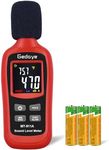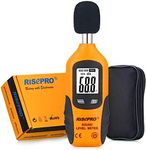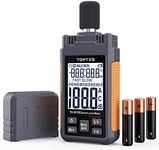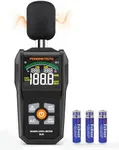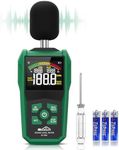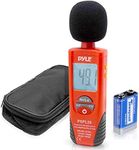Buying Guide for the Best Decibel Meters
When choosing a decibel meter, it's important to understand the key specifications that will help you find the best fit for your needs. Decibel meters, also known as sound level meters, are used to measure the intensity of sound in decibels (dB). They are essential tools for various applications, including workplace noise assessments, environmental noise monitoring, and audio system calibration. To make an informed decision, you need to consider several key specifications that determine the performance and suitability of the decibel meter for your specific use case.AccuracyAccuracy refers to how close the measurements of the decibel meter are to the actual sound levels. This spec is crucial because it determines the reliability of the data you collect. Accuracy is usually expressed as a margin of error, such as ±1 dB. For general use, an accuracy of ±2 dB is often sufficient. However, for professional applications like occupational health and safety assessments, you may need a meter with higher accuracy, such as ±1 dB or better. Consider your specific needs and the level of precision required for your measurements when evaluating accuracy.
Frequency RangeThe frequency range indicates the range of sound frequencies that the decibel meter can accurately measure. This is important because different sounds have different frequencies, and you want a meter that can capture the full spectrum relevant to your application. A typical frequency range for general-purpose decibel meters is 20 Hz to 20 kHz, which covers the range of human hearing. If you are measuring specific types of noise, such as industrial machinery or musical instruments, ensure the meter's frequency range includes those frequencies. Choose a meter with a frequency range that matches the sounds you need to measure.
Measurement RangeThe measurement range specifies the range of sound levels that the decibel meter can measure, usually expressed in decibels (dB). This is important because it determines the loudness levels the meter can handle. For example, a measurement range of 30 dB to 130 dB is common and suitable for most environments, from quiet rooms to loud industrial settings. If you need to measure very quiet or very loud sounds, look for a meter with an extended measurement range. Consider the typical sound levels in your environment and choose a meter with a measurement range that covers those levels.
Weighting FiltersWeighting filters, such as A-weighting, C-weighting, and Z-weighting, are used to adjust the meter's response to different frequencies to match human hearing or specific measurement standards. A-weighting is the most common and is used for general noise measurements, as it mimics the human ear's sensitivity to different frequencies. C-weighting is used for measuring peak sound levels, and Z-weighting provides a flat response across all frequencies. Depending on your application, you may need a meter with multiple weighting filters. For general use, a meter with A-weighting is usually sufficient, but for more specialized measurements, consider a meter with additional filters.
Display and InterfaceThe display and interface of the decibel meter determine how easy it is to read and interpret the measurements. A clear, backlit display is important for reading measurements in various lighting conditions. Some meters also offer digital interfaces, such as USB or Bluetooth, for connecting to computers or mobile devices for data logging and analysis. Consider how you will use the meter and whether you need features like data storage, real-time data transfer, or advanced analysis capabilities. Choose a meter with a display and interface that meets your needs for ease of use and functionality.
CalibrationCalibration ensures that the decibel meter provides accurate measurements over time. This is important because the accuracy of the meter can drift due to environmental factors or regular use. Some meters come with a built-in calibration feature, while others require an external calibrator. Regular calibration is essential for maintaining the accuracy and reliability of your measurements. If you need precise and consistent data, choose a meter that is easy to calibrate and consider the availability of calibration services or accessories.



